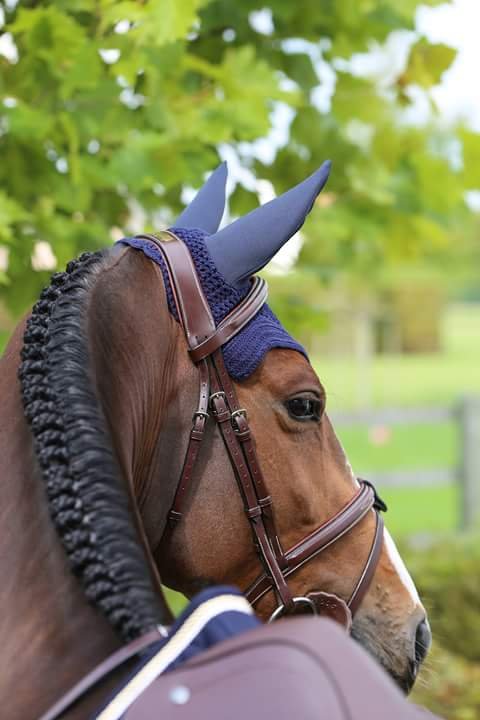Horse noseband
approximately two fingers' width below the cheekbone.
The crank, however, can be easily abused. "I hate the term 'crank' because it implies that that is exactly what you do with it," asserts Lisa Gorretta, a U.S. Equestrian Federation dressage technical delegate and owner of The Paddock Saddlery, in Chagrin Falls, Ohio. She prefers the term "adjustable" for this noseband.
"It can help you have a better fitting bridle by having it snug but not overly tight," she continues. "Unfortunately, a lot of people think that if a little is good, a lot is better."
Worn too tightly, a crank can close your horse's jaw too much, preventing the muscle relaxation necessary to maintain soft contact with the bit. It can also press his cheek against his teeth in a painful way.
Flash Noseband
Other name: Aachen
This is a thin strap attached at the centerpoint of a plain or crank noseband. The strap drops down at an angle below the bit and is secured under the chin. It is very effective in keeping the horse's mouth closed, so much so that it's actually called a "mouth closer" in Germany.
A flash noseband. | Photo ? Arnd Bronkhorst
Thanks to its position low on the head, it is also used to prevent your horse from crossing his jaw, putting his tongue over the bit and attempting other evasive ?maneuvers, all of which require him to be able to open his mouth more widely than needed to engage correctly with the bit.
The flash was developed to help close the mouth while also having a noseband that can anchor a standing martingale. It has become ubiquitous in the jumper ring and in schooling for all divisions.
Some flashes are attached to the noseband via a permanent loop. "Convertible" or "removable" flashes are fastened to the noseband with either a detachable strap that goes around the noseband or by ?using a discreet slot in the noseband through which the attaching strap is threaded.
Correct positioning is critical for the flash to do its job properly, Lisa notes. The first step is securing the regular noseband correctly, approximately two fingers' width below the cheekbone and running straight around the horse's nose. Then the flash can be secured under the chin groove, followed by checking that the noseband has been cinched tight enough so the flash doesn't pull it down on your horse's face. The centerpoint of any --noseband should always rest against the nasal bone as opposed to the soft cartilage near the nostrils. Securing it too low, over the cartilage, can restrict your horse's air intake, which is critical in any work and especially for cross country, jumping and galloping.
Lisa notes that riders sometimes think they are doing their horses a kindness by securing the noseband a little loosely, then compensate by adjusting the flash very tight. That can pull the noseband down, thus lowering the flash's anchor point and placing it too low on the nose.
Drop Noseband
Other name: Hanoverian
Invented by a German trainer who worked at the Spanish Riding School, this noseband encircles the horse's nose at a lower point than its regular counterpart: below the bit and at a point parallel to the horse's chin groove, yet still resting on the nasal bone.
A drop noseband. | Photo by Stacey Nedrow-Wigmore
Worn properly, this noseband is a clear reminder for your horse to keep his mouth closed and prevents him from crossing his jaw. It's a popular aid in training young horses who are just learning to accept the bit. The drop used to be quite popular in dressage, but that has given way to crank-with-flash combinations. Some riders and trainers
say that the drop's low position on the nose makes it less flattering to the look of their horses' heads and attribute its decrease in popularity to that. The drop's placement also makes it unsuitable for ?attaching a martingale.
Figure Eight Noseband
Other names: crossed, Grackle,
A figure eight noseband. | Photo ? Stacey Nedrow-Wigmore